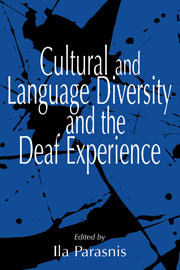Book contents
- Frontmatter
- Contents
- Preface
- PART I BILINGUALISM-BICULTURALISM AND THE DEAF EXPERIENCE: AN OVERVIEW
- PART II PSYCHOSOCIAL, COGNITIVE, AND LANGUAGE EXPERIENCES OF DEAF PEOPLE
- PART III THE DEAF EXPERIENCE: PERSONAL REFLECTIONS
- 13 Growing up Deaf in Deaf Families: Two Different Experiences
- 14 Another New Birth: Reflections of a Deaf Native Signer
- 15 Raising Deaf Children in Hearing Society: Struggles and Challenges for Deaf Native ASL Signers
- 16 In Search of Self: Experiences of a Postlingually Deaf African-American
- 17 Living in a Bilingual-Bicultural Family
- 18 On Being Both Hearing and Deaf: My Bilingual-Bicultural Experience
- Name Index
- Subject Index
16 - In Search of Self: Experiences of a Postlingually Deaf African-American
Published online by Cambridge University Press: 05 June 2012
- Frontmatter
- Contents
- Preface
- PART I BILINGUALISM-BICULTURALISM AND THE DEAF EXPERIENCE: AN OVERVIEW
- PART II PSYCHOSOCIAL, COGNITIVE, AND LANGUAGE EXPERIENCES OF DEAF PEOPLE
- PART III THE DEAF EXPERIENCE: PERSONAL REFLECTIONS
- 13 Growing up Deaf in Deaf Families: Two Different Experiences
- 14 Another New Birth: Reflections of a Deaf Native Signer
- 15 Raising Deaf Children in Hearing Society: Struggles and Challenges for Deaf Native ASL Signers
- 16 In Search of Self: Experiences of a Postlingually Deaf African-American
- 17 Living in a Bilingual-Bicultural Family
- 18 On Being Both Hearing and Deaf: My Bilingual-Bicultural Experience
- Name Index
- Subject Index
Summary
For the first twelve years of my life, I was one of five normally hearing siblings in my family. My existence revolved around my African- American family residing in the nation's capital at a time that I often characterize as a kind of twilight in the African-American experience. I came of age in the post-1954 school desegregation era, when the law had been declared, but when the realities of one's life as an African-American fell into a timeless zone between what had been mandated by the law and what was yet to be. And for African-Americans in the years immediately following Brown v. Board of Education, “that which was yet to be” had not dissolved the invisible but still discernible physical and geographical boundaries that shaped my life and experiences from early childhood to early adulthood. In this “post-desegregation” era, I lived in neighborhoods and attended schools populated only by other African-Americans.
Like my siblings and my mother, I was born in Washington, D.C., and the early years of my life, as I knew it, were beautiful, rich, and thoroughly rewarding. My life was centered around a close-knit nuclear family. It was also dominated by many extended family members, including a maternal grandmother whose story-telling and reminiscing provided wonderfully engaging volumes of folklore that instilled in me a sense of ethnic and personal pride that remains even today a fundamental core of my self identity.
- Type
- Chapter
- Information
- Cultural and Language Diversity and the Deaf Experience , pp. 246 - 257Publisher: Cambridge University PressPrint publication year: 1996



